Top 5 BLW Questions Answered

LISTEN TO THIS EPISODE
Episode Description
If you’re feeling STUCK about starting solid foods, I’m answering some of the most common questions about baby-led weaning in this episode. From what to do if your baby breaks off a piece of food in their mouth to when they’re not eating and you feel like you’ve tried everything, this episode covers five frequently asked baby-led weaning questions I’m hearing right now from parents of babies who are just starting solid foods.
Links from this Episode
- My friend and fellow dietitian Dani Lebovitz, MS, RDN makes amazing food-centered activity books that are great if you have toddlers or older kids, check her out on Instagramhttps://www.instagram.com/kid.food.explorers/
- Baby-Led Weaning with Katie Ferraro program with the 100 First Foods™ Daily Meal Plan, join here: https://babyledweaning.co/program
- Baby-Led Weaning for Beginners free online workshop with 100 First Foods™ list to all attendees, register here: https://babyledweaning.co/baby-led-weaning-for-beginners
Other episodes related to this topic:
- Episode 296 - Top 5 BLW Questions Answered
- Episode 236 - Positive Tilt: Get Permission from Your Baby with Marsha Dunn Klein, OTR/L, MEd, FAOTA
- Episode 309 - Added Sugars: Which Ones to Avoid for BLW

Latest Episodes
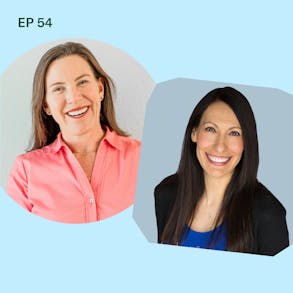
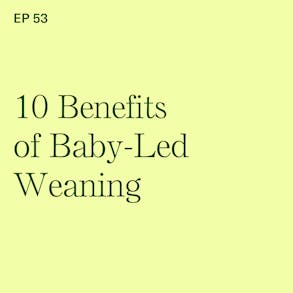
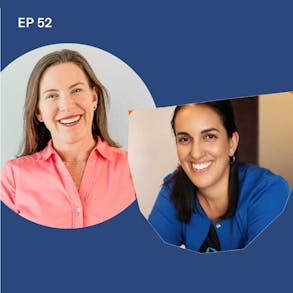
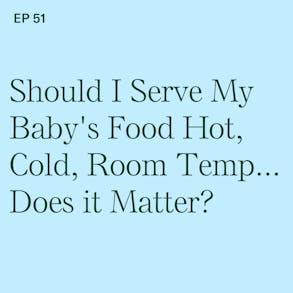
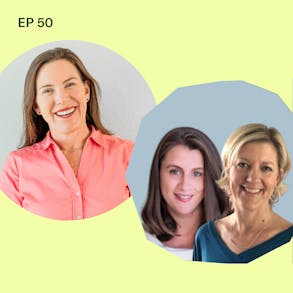
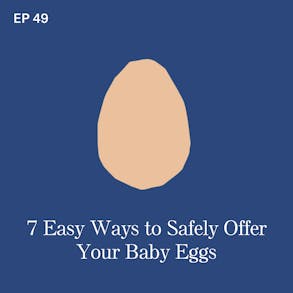
Katie Ferraro (1m 1s):
While you might be interested in baby-led weaning for any one of a number of reasons, we hear from a lot of parents who have a second or subsequent child and they're like, you know what, I'm gonna give this a shot because my older child who is picky and we did conventional spoon feeding with and it was a drag, I don't wanna deal with that picky eating business anymore, but I need you guys to know too that there's absolutely no way to prevent picky eating. The data shows us that baby-led weaning has the potential to lower the severity of the picky eating, and that's because you're really taking advantage of this flavor window where your baby will like and accept a wide variety of foods early and often. But hello, you have to actually safely make those foods and offer them to the baby in order to get them to like and accept the foods.
Katie Ferraro (1m 46s):
Hey there. I'm Katie Ferraro, registered dietitian, college nutrition professor and mom of seven specializing in baby-led weaning here on the Baby-Led Weaning Made Easy podcast. I help you strip out all of the noise and nonsense about feeding, leaving you with the confidence and knowledge you need to give your baby a safe start to solid foods using baby-led weening. Hey guys, welcome back. Today I'm gonna be answering five very frequently asked baby-led weaning questions. I love it when we do these episodes, I think like every 50 or so episodes, we maybe do these. And so each week I teach this free online video workshop called Baby-led weaning for beginners, and at the end there's a Q&A and parents ask questions.
Katie Ferraro (2m 34s):
If we don't get to the questions on the workshop, then they come in as emails. And Katelynn, who's a dietitian on our team who also specializes in baby-led weaning, she responds to all the questions, but there's like a hundred repeating questions. So we have this big Google doc organized by the different topics where we can cut and paste the answers, and then we obviously tweak them and tailor them to meet that particular person's question and then send additional resources where you can find out more info on that topic. So Katelynn has curated these questions based on in the past week, the most frequently asked questions that she's seen. I'm just gonna go through five of them. We last did this back in episode 296. So if you really like FAQs, take the free online workshop, baby led weaning for beginners, you can sign up at babyledweaning.co.
Katie Ferraro (3m 22s):
I personally feel like I learned so much from listening to other people's questions. I'm like, yeah, I had that exact same question, or, huh, I never really thought about it that way. So I love doing FAQs. I'm gonna dive right in. I'm gonna go through the five questions that Katelynn typed up for me here, and then share another piece of content or a resource where you can find out more information about that topic. So the first one, my baby doesn't want to pick up the food and just wants me to feed them. What do I do? I love this question, and your baby doesn't really know how to pick up food early on in baby-led weaning, and that is to be expected. A lot of times we wanna fix everything for our babies and make their lives easier, but we must remember that learning how to eat this is a continuum, this whole weaning process, right?
Katie Ferraro (4m 11s):
Your baby does not wake up on their six month birthday and magically know how to eat a hundred different foods. They need lots of time and space and grace to practice. So do not feed your baby the foods. That's the first recommendation. If we want to teach babies how to feed themselves, we have to remember what our jobs are, right? And if we take Ellen Saturn's division of responsibility in Feeding theory and apply it to our own lives, Ellen Saturn is a registered dietitian and a licensed therapist, and she has a very, very simple theory that's so helpful whenever you're feeling stressed about feeding your baby, remember that you have three jobs. You're in charge of what the baby eats and where they eat and when they eat, but your baby is ultimately in charge of how much or even wether they eat.
Katie Ferraro (4m 51s):
So if you're feeling like, oh my gosh, my baby's not eating, they won't eat the food, I have to feed it to them. No, you don't. It's not your job to make your baby eat. Now, in the first few days of starting solid foods when your baby has never had any experience with anything in their mouth except infant milk, yeah, we can help point them in the right direction, but that's different than putting the food directly in their mouth. Putting anything in your baby's mouth, including a spoon or a piece of food, can be a choking hazard. With the baby-led approach, we wanna set the baby up for success so that they can feed themselves. So the first few days, I will take the soft solid strips of food that we're offering. They're about the size of your adult pinky finger, and I sometimes will put them in my hand and then put my hand out to the baby and watch the baby and see how they respond.
Katie Ferraro (5m 38s):
What are their cues telling me? Are they gonna reach for it? Is me having it in my hand making it easier for them to get it into their hands? What I'll actually even do the first few days sometimes for certain babies if they're like not even into touching it, is I will put the piece of food in their hand and wrap it their little tiny fingers around the food just so they know, oh, hmm, I can hold onto it like Beth, and then I'll help gently guide the hand to the mouth. And I'm not forcing them, I'm not shoving the food into their mouth, but as it gets close to their nose, when they start to smell the food, right, we taste with our nose before our mouths, right? The aroma of the food comes through food. Sometimes when they smell that there's something there, they kind of perk up and they look at the food a little bit differently and then will be more inclined to bring it to their mouth.
Katie Ferraro (6m 21s):
But I don't put the food in my baby's mouth. You don't need to do that. There's this concept known as the Positive tilt, which is a concept coined by Marsha Dunn Klein leading pediatric expert in infant feeding. Marsha's been on the podcast numerous times. If you go back to episode 236, she teaches all about the positive tilt and how to get permission from your baby. And there's lots of wonderful tips from Marsha in that interview about how to react when you think your baby wants you to feed them. Also, if you search any of the other episodes with Marsha Dun Klein, she just has such a wonderful way of talking about connection and really listening to your baby's feeding, their hunger, their fullness cues like you hear that all the time, but Marsha's the one that shows you how to do it.
Katie Ferraro (7m 6s):
So I would suggest listening to that. Again, episode 236, positive tilt, get permission from your baby with Marsha Dunn Klein. Question number two, my parents fed my baby a cookie followed by five exclamation points. Is it going to be harmful that baby had sugar and salt? No, you guys, I have done a thorough literature review and have come up with absolutely no documented instance in the peer review literature that indicates babies have died from eating a cookie.
Katie Ferraro (8m 14s):
All the time we hear about my grandma, my mother-in-law. Oh no, the babysitter, my husband, they all gave the baby a cookie or some cake. Now is that something we want babies to be eating every day? No, but I literally also had a mom use the term, did I do irreparable damage to my baby by letting them have a cake? No, absolutely not. If in your family you celebrate with foods like birthday cake on birthdays and you want to offer your baby a real cake, do it. This is episode 337, and if you're looking for my episode on how to make a sugar-free, gluten-free, no salt smash cake for your baby's birthday, you can't find it because in my family, we eat birthday cakes on our birthday and I'm totally fine with my baby having some birthday cake. If you're not fine with that, that's fine.
Katie Ferraro (8m 55s):
It's probably between you and your parents, but a little bit of sugar here and there is not going to cause irreparable damage, okay? So don't stress yourself out about that. Your baby's actually already tasted sweet taste. I hate to break it to you, right? If you've ever had a taste of breast milk or formula, duh, it's sweet. The naturally occurring milk sugar in breast milk is lactose. Babies have already had sweet foods and it's not gonna cause them to have an undue affinity for sweet foods. I definitely wouldn't get in the habit of offering it every day or every meal, and there's certainly no place for baby food desserts. Like when I was a baby, my mom told me I wish she had an iPhone back in the day or took pictures of it, but like there would be baby food desserts in the baby food aisle, like think about that.
Katie Ferraro (9m 39s):
We now know, of course, obviously no added sugar for babies prior to two years of age is the recommendation from the American Academy of Pediatrics. But you'll be shocked, there's a lot of baby junk food out there that does have added sugar in it. They don't call it desserts, but you see, it was at Walmart the other day for this WIC project that I was working on. We spoke at the National WIC Association meeting teaching all about how to use extra purees from the WIC program and incorporate them into finger foods. And I was sharing all these new recipes we made. So I had to do a lot of shopping at Walmart, which is where you can get in my town the greatest selection of WIC approved pureed foods. And there was, I got sidetracked and like there was so much crappy added sugar baby food on the shelf. It was like blowing my mind like, how can you possibly market this? My favorite are the yogurt bites, like they have added sugar and then they have added salt in them.
Katie Ferraro (10m 23s):
And spoiler alert, if it were yogurt, it wouldn't be shelf stable, like if it was actually a yogurt product. Yogurt is found in the refrigerated section, and guess what? Babies can eat real yogurt. But I digress back to the added sugars, not the end of the world. If you're confused about added sugars, go listen to episode 309. It's called added sugars, which ones to avoid for baby-led weaning. I teach a little bit more about that, but at the end of the day, ultimately we're looking for zero grams of added sugar on the labels of the foods that we offer our babies. But if your baby had a bite of a cookie, okay, now if it had nuts in it, like just to put the dietitians side of the spin on this, if there's nuts in it, intact nuts can be a choking hazard for babies. So I would not want the cookie with the nut in it, but if it was just like a soft cookie and your baby did fine with it, it probably had an enjoyable experience.
Katie Ferraro (11m 6s):
But don't get in the habit of offering added sugars to your baby. All right, question number three, what if I don't eat a food on your hundred first foods list? Do I still need to serve it to my baby? Hey, there's no hard and fast rules about what you have to feed your baby, okay? I like to focus on all the foods that babies can eat. That's kind of the whole underpinning and the cruxt of my hundred first foods list because if we look at a conventionally spoon fed baby, those babies have generally had 10, sometimes 15 foods by the time they turn one. And since we know that nearly all babies will experience some form or degree of picky eating or food neophobia moving into the second year of life, if you lose those 10 or 15 foods to picky eating, that becomes a very challenging child to feed. But if your baby's had, let's say a hundred foods by the time they turn one and then you lose 10 or 15 of those to picky eating, it's no big deal, right?
Katie Ferraro (11m 52s):
There's still 85 or 90 foods your baby will eat. So that's the premise of the 100 First Foods approach. There's no actual magic in the number a hundred other than you are certainly on your way to achieving diet diversity. And there's this whole body of research that's emerging now about the importance of diet diversity, offering a variety of different foods early and often when your baby will take advantage of it. So you yourself, you may identify as a picky eater. A lot of times parents will be like, I don't want my baby to have the picky eating problems that I have or my husband has or my partner has, or that our older child has, and that's why they're interested in picky eating. But I want you to know there is absolutely no way to prevent picky eating. You can reduce the severity of picky eating by offering a wide variety of foods.
Katie Ferraro (12m 36s):
And I don't like all the foods on my 100 First Foods list. And in particular, beets make me gag so hard. I can't even stand the smell of them cooking. But do I offer beets to my babies and every baby I work with? Oh, heck yeah, because babies love beets. I have been conditioned to not like beets, but when babies are in that all important flavor window, oh my gosh, they'll eat just about anything. And the more exposure that they have to that food, the more likely they will be to accept it. And even if you don't like those foods, no one says you have to eat it. But if you're down for preparing it, your baby will almost certainly like it. If you don't have a copy of my 100 First Foods List, beets are on there as well as a few other foods that I personally will admit are not my favorite, but I've made every food on that 100 First Foods list many times for babies, and I wanna make sure that you don't run out of ideas for your baby to eat.
Katie Ferraro (13m 22s):
You can sign up for my free workshop, baby-led weaning for Beginners. Grab your copy of the 100 First Foods list, learn a little bit more about like the visual side of how to prep these foods safely for baby led weening. That's all at babyledweaning.co.
Katie Ferraro (14m 41s):
Next question. My older child is picky. Can they try the foods too? Oh, two picky eating questions. Katelynn, this is kind of interesting. We hear from a lot of parents who say, okay, this is my second baby and it's the the only thing I'm trying new. I wanna do this baby-led weaning thing because I did spoon feeding with my oldest, and they're picky. What gives, as I mentioned, there's no way to prevent picky eating and the idea of reversing picky eating with a toddler is challenging. But we do know that for toddlers and older children, the more involved they are in meal preparation, the more likely they are to eat said meal. And I know cooking with toddlers and children is the most annoying thing in the world. There's very few things more annoying than it, but if you're all in with making the foods for your baby, you might as well involve the older kid if you can, because a lot of times you can say, you know, tell the baby, what's the food that we're trying today?
Katie Ferraro (15m 30s):
What's it called? What does it smell like? What does it feel like? How did you make this food for the baby? Do you wanna show the baby how you can eat the food? I mean, you can do all your mom or dad or caregiver, grandparent stuff with that older kid, but we do know that those kids who had a hand in meal prep are more likely to actually try the food. So don't get out of the habit of offering your older children a variety of foods as well. And we have a lot of parents who are like, hey, I dug your 100 First Foods list out and I'm going back through it with my toddler because they need more exposure to different foods. And I myself as the one preparing the foods and getting in a rut like that, pasta, potato and rice rut, especially for carbohydrate foods. There's so many other whole grain foods out there. There's so many other starchy foods that children can eat.
Katie Ferraro (16m 11s):
There's nothing wrong with a little bit of pasta, potatoes, and rice, but we don't wanna get in that rut. So try to get that older child involved. And another resource that I have, my friend Danny, who's is a registered dietitian, she used to be in the Southern California area, but she recently relocated to Nashville. She has three girls. She is an amazing author and she makes these beautifully illustrated vegetable and fruit and food cookbooks. If you go to her Instagram Kid.Food.Explorers, they're like these really cool activity in coloring books. She sent me all of them. It's like, where's one that's called? Where does Broccoli come from? There's another one called Where Do Bananas come from? She has literally so many different workbooks. She sent me everything she has my kids, the big kids, the little kids.
Katie Ferraro (16m 52s):
They love these books. And there's pages of information and activities and coloring stuff for each of the different foods. So for your slightly older child, if like, let's say the baby's trying asparagus, okay, that's a food that we recently covered back in episode 335. I went through how to make asparagus safely for your baby. If your bigger kid has fallen outta favor with asparagus, get out the Where does Broccoli book come from that Danny wrote. Go to the asparagus page. There's some little kiddo fun facts about asparagus. Actually learn a lot about vegetables from Danny's books. Again, she's on Instagram, Kid.Food.Explorers, and I think those are wonderful resources for getting your kids familiar with some different foods at their a little bit older kid or toddler and on age appropriate level.
Katie Ferraro (17m 33s):
Alright, last question. Can my baby start even if they don't have any teeth? Oh, heck yeah. You guys having or not having teeth has absolutely no bearing on your child's readiness to eat or start solid foods. So some babies are born with teeth. It's so wild. Check it out. Google photos of babies born with teeth. Actually, my youngest son, Gus was asking me about this the other day. So we opened up Google Photos and she just, sorry, newborns with teeth is so wild. But also some other babies don't get teeth until age one. I always tell my friend Kate, who's a dietitian, both of her girls didn't get any teeth until after they turned one. And we know that starting at six months of ages went from a nutritional standpoint. Babies start needing the nutrition that comes from complimentary foods.
Katie Ferraro (18m 13s):
And it doesn't matter whether or not they have teeth. There are certainly a few foods that I wait until baby has teeth before eating. That's just personal preference after having fed lots and lots of babies, things like chicken on the bone, like if you're doing drumsticks, I'll wait until a baby has a tooth, because it's a much more efficient process for them to get the meat off the bone when they have teeth. Corn on the cob is another one where it's so amazing to watch babies eat corn on the cob, but it's like way more amazing when they can actually do it if they have one or two teeth against which to kind of rip the corn cobbs off. So some foods maybe you would wait a little bit longer until your baby has teeth. But as far as like needing teeth to start solid foods, absolutely not.
Katie Ferraro (18m 53s):
All right, thanks for the questions, Katelynn. Thanks for grabbing those. If you guys wanna take that free workshop and ask your own questions about starting solid foods, I'd love to hear from you. You can sign up for this week's workshop times at babyledweening.co. Thank you to our partners at AirWave Media. They make podcasts about things like food and science and using your brain. Thank you AirWave, for letting us be a part of your network. And we're online at blwpodcast.com. I'll see you guys next time.

The Program Baby-Led Weaning with Katie Ferraro
A step-by-step digital program for starting solid foods safely and navigating the original 100 FIRST FOODS™ meal plan with baby-led weaning.
 EXPERT-LED, PROVEN APPROACH TO EATING REAL FOOD
EXPERT-LED, PROVEN APPROACH TO EATING REAL FOOD CONCISE VIDEO TRAININGS TO MASTER BABY-LED WEANING
CONCISE VIDEO TRAININGS TO MASTER BABY-LED WEANING 100 FIRST FOODS DAILY MEAL PLAN WITH FOOD PREP VIDEOS
100 FIRST FOODS DAILY MEAL PLAN WITH FOOD PREP VIDEOS
Baby-Led Weaning for Beginners Free Workshop
Is your baby ready to start solid foods, but you’re not sure where to start? Get ready to give your baby a solid foundation to a lifetime of loving real food…even if you’re feeling overwhelmed or confused about this next stage of infant feeding.
Get baby-led weaning recipes and tips delivered to your email inbox.

